MPs of all political stripes have unanimously voted in favour of a Senate bill that would create new offences in relation to forced organ harvesting and trafficking abroad—passing it after nearly 15 years of legislative efforts with similar bills.
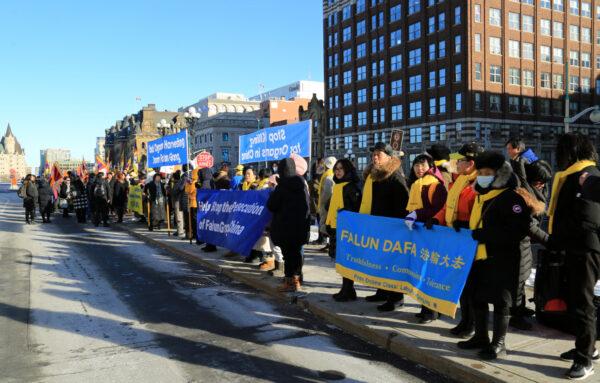
Winnipeg-based human rights lawyer David Matas, who has researched the Chinese regime’s organ harvesting of Falun Gong adherents, said the passage of the legislation means lives will be saved.
“Stopping organ harvesting would mean that innocents would cease to be killed for their organs, an important result, if it does happen, since there are many victims of this abuse,” Matas said in an email on Dec. 13.
Falun Gong is a meditation and spiritual discipline based on the principles of truthfulness, compassion, and tolerance. Under the rule of then-leader Jiang Zemin, the CCP launched a far-reaching campaign of persecution against the practice in 1999, which continues to this day.
Bill S-223 will make it a criminal offence for a Canadian citizen or a permanent resident to go abroad to receive an organ taken from someone who did not give informed consent to the removal of the organ
It will also amend the Immigration and Refugee Protection Act to deny a permanent resident or foreign national access to Canada if they have engaged in activities relating to the trafficking of human organs.
Celebration
Falun Gong adherents and Uyghurs were invited to the House of Commons gallery by Genuis to observe the vote on Bill S-223, while Tibetans observed the vote on a motion regarding the Sino-Tibet Dialogue and Middle Way approach.Prior to the votes, the respective groups rallied in front of the West Block on Parliament Hill, holding signs and banners and voicing their support for the bill and the motion.
Speaking at the rally, Genuis paid tribute to the work of Matas and Kilgour.
“[They] did the initial work of uncovering and exposing all that was happening in China with forced organ harvesting and trafficking, and of course the Falun Gong community has been so active protesting, petitioning,” he said.
Genuis also made special mention of former MPs and Ataullahjan, who introduced similar bills over the last 15 years.
“Lots of people have been involved in this effort,“ he said, ”but the biggest contribution has been the community that has gone out and gathered petitions, signatures, people whose names aren’t as well known but who have done the work on the ground of advocating to their MPs, as well as organizing.”
After the vote, the three groups marched eastward along Wellington Street to the Chinese Embassy, where they held a rally and celebrated the victory of the passing of S-223.
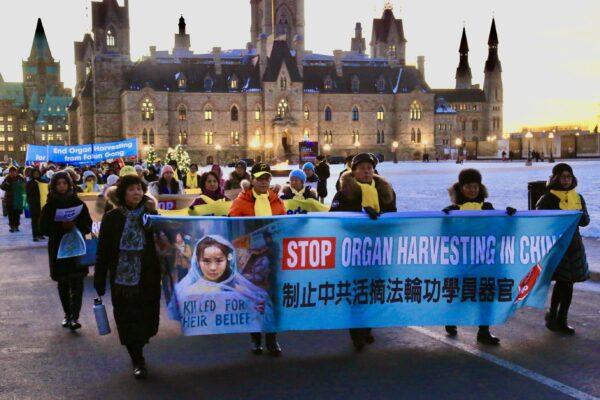
Speaking just before the march started, Conservative MP Arnold Viersen said he has presented hundreds of petitions in the House of Commons calling for the end of the forced organ harvesting in China, and for the federal government to do something about it.
Viersen also paid tribute to Kilgour’s contribution to the anti-organ harvesting movement.
“He was really the one that is the inspiration for me for working on this issue and he has done a lot of the hard work. This has been over 15 years in the making. It’s a big day for celebration,” he said.
Inherent Dignity
The celebration continued after the march as the groups gathered at a reception held in the Wellington Building on Parliament Hill, where Genuis delivered remarks on the historic win.“[Everyone possesses a] God-given dignity as human beings, and what we are trying to do when we speak about human rights is defend the idea of the inherent worth and dignity of all human beings—no matter where they live, no matter what faith they practice, no matter how big or how small they are, how old how young, how dependent or independent—that dignity is inherent in all human beings,” he said.
He added that Bill S-223 is special because it is an extraterritorial application of criminal law.
“That’s us saying in our Criminal Code, we are prepared to prosecute crimes that are committed by Canadians beyond our borders,” he said.
“That’s an expression of our commitment to universal human solidarity, to not just punish torture crimes and injustice that happened here in Canada, but to be willing to use our Criminal Code to say that certain things done to a human being are wrong and should be prosecuted not only if they happen here, but wherever they happen in the world, because they are universally wrong.”

Ataullahjan, who also attended the reception, said the passing of Bill S-223 is “a good day to celebrate.” The senator had attempted four times in the last five years to get similar bills passed.
“We have seen organ harvesting is growing, it’s not getting less,” she told The Epoch Times. “And I think Canada was one of the few countries that we weren’t in line with our allies. Most of them had legislation, and we did not have legislation, so this legislation was long overdue, and I’m very very happy that finally we managed to get it done.”
Conservative MP Tako van Popta said Canadians “always stand up for human rights” when asked what impact the passing of Bill S-223 will have in Canada and around the world.
“So I think this just stands with compliance how Canadians think,” he told The Epoch Times. “As much as we do love China, we do want minorities around the world to be protected.”
In an interview after the reception, Conservative MP Cheryl Gallant said she first learned about Falun Gong, and the atrocities the CCP inflicted on adherents, from fellow MP Scott Reid when she was elected in 2000.
“What struck me is we have so many people who are indifferent toward it, and now, after two decades, finally achieving this milestone” she said.
‘The Terrible Practice of Organ Harvesting’
Before entering House to vote on Bill S-223, Conservative MP Michael Chong said Canada needs to take a stronger approach against authoritarian regimes while standing up for democracy and the rule of law.“We need to take a stronger stand on defending our values, our belief in democracy, our belief in freedom, our belief in human rights and the rule of law, and that begins here at home by passing measures like this bill here today at the House of Commons that will prohibit people in this country from participating in the terrible practice of organ harvesting, particularly political prisoners,” he told The Epoch Times.
Chong, the Conservative’s shadow minister for foreign affairs, said the approach taken by Western democracies toward authoritarian regimes is wrong-headed.
“After the fall of the Berlin Wall, we thought that the best way to improve the human rights records of authoritarian regimes like the Russian Federation, and the People’s Republic of China, was to deepen and broaden ties with these countries through trade and investment,” he said.
Past Bills
While testifying before a Senate committee last April about Bill S-204, Bill S-223’s predecessor, Kilgour noted that many countries already have laws in place to combat organ trafficking, and said it’s “embarrassing” that Canada doesn’t yet have such legislation.

All three MPs have said their efforts to fight organ harvesting crimes was inspired by Matas and Kilgour’s book “Bloody Harvest.”
Moral Principle
Speaking in Parliament on Dec. 5, Liberal MP Sameer Zuberi, a co-sponsor of Bill S-223, said the bill is a critical piece of legislation that would “help us address a grave and serious human rights concern” and sends a “clear and strong signal that we as a country do not accept this [crime].”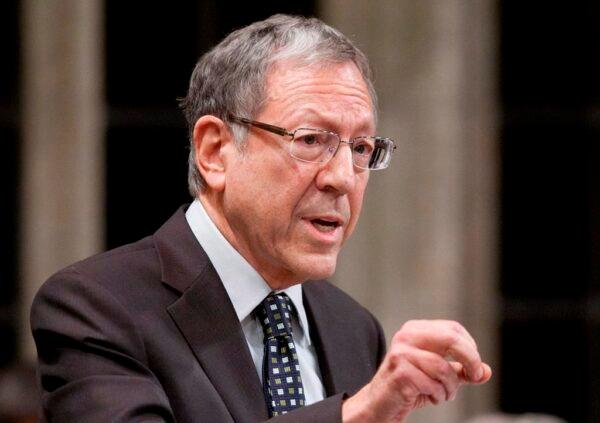
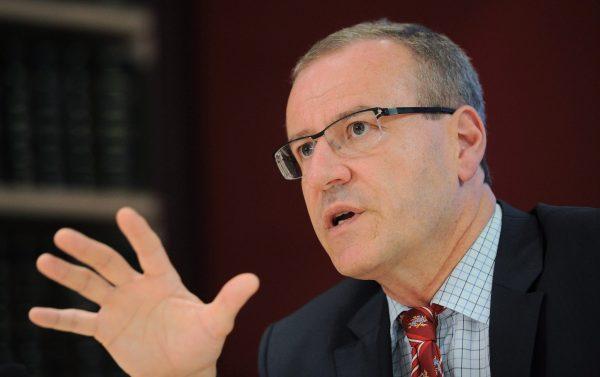
Zuberi noted that the Criminal Code does not address criminality with regard to organ harvesting outside of Canada, which the bill aims to address.
“The absence of any limits on national sovereignty aimed at protecting universal human rights would create a reality in which we would look the other way when nations would commit the most dastardly crimes toward their own people,” he said in the House on Dec. 5.
‘Barbaric Practices’
NDP MP Alistair MacGregor said he was glad there is recognition among MPs that Bill S-223 is an important and long-overdue change to criminal law.“I think it sends a strong message to people who live around the world, who are not only facing these barbaric practices under regimes such as China,” he said on Dec. 5.
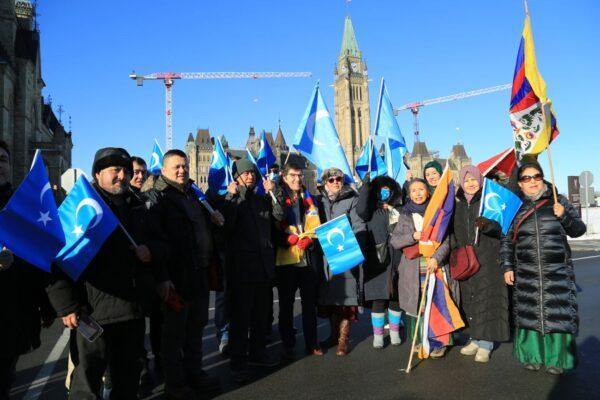
Bloc Québécois MP Kristina Michaud said it is the duty of MPs to legislate Bill S-223 because it is “a step in the right direction when it comes to fighting organ trafficking.”
“This is a matter of organized crime with many offenders, recruiters, transporters, hospital clinic personnel, health professionals who carry out the surgery, intermediaries, buyers, organ banks—there are many actors involved,” she said.
“They are hiding their wealth, taking advantage of our strong banking system, taking advantage of our fairly robust real estate market, and capitalizing on the illicit gains they have been able to achieve because of this illegal trade in organs,” he said.
“We also need to make sure that those who know they are purchasing organs through this gross human rights violation of illegal organ harvesting face the full cost and full force of law here in Canada.”





